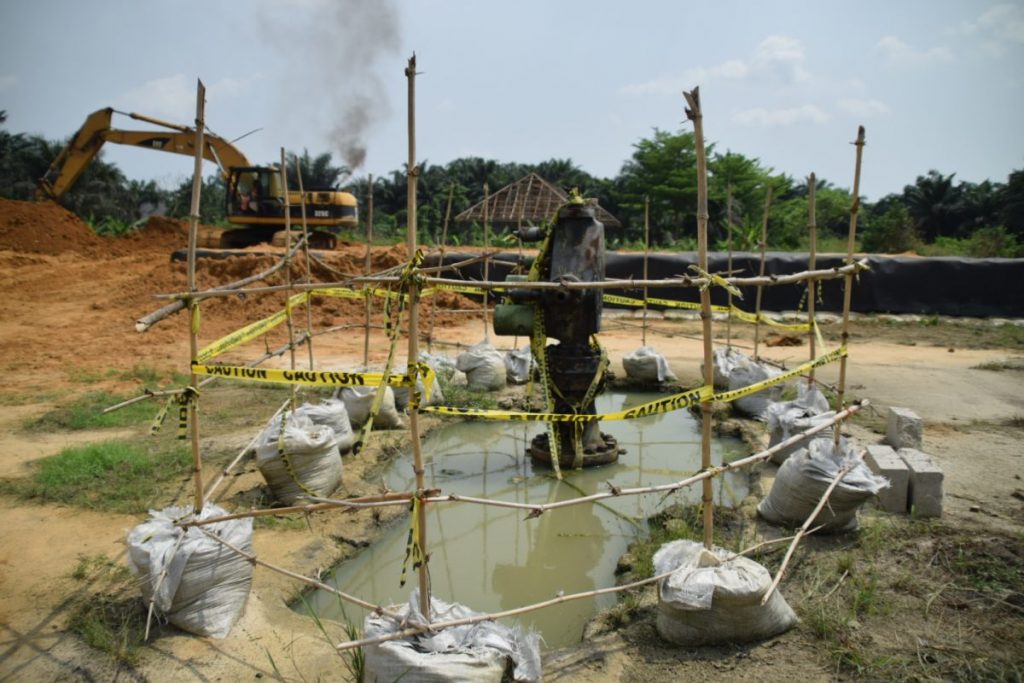 11 February 2014, Accra – The Ghana’s Continental Shelf started oil and gas production in 2010 making it one of the youngest oil producing nations in the world. The production from the Jubilee oil fields is expected to create employment opportunities and make significant contributions to the national purse.
11 February 2014, Accra – The Ghana’s Continental Shelf started oil and gas production in 2010 making it one of the youngest oil producing nations in the world. The production from the Jubilee oil fields is expected to create employment opportunities and make significant contributions to the national purse.
As a new oil producing country, the government places emphasis on local content requirements to ensure that a good number of Ghanaians are employed by the companies. Hence, the recent passage of the Local Content Law for the oil sector makes it mandatory for job creation through the use of local expertise. Already, the oil companies have generated thousands of jobs for Ghanaians. Notwithstanding, the country’s continental shelf’s oil and gas industry is bedevilled with recruitment problems. One major challenge facing the industry world-wide is shortages of skills. This is more severe in Ghana due to the immaturity of the industry and insufficient capacity building in the acute areas. Also, demand for skilled labour exceeds the supply, insufficient skilled applicants, competition for labour among the oil companies and high cost of labour. Again, the industry is relatively young in Ghana and many people have not yet taken the advantages it offered.
Globally, skills shortages have hit the oil and gas industry for many years now. From the drilling rigs to air-conditioned offices, the industry has witnessed labour difficulties that threaten negatively oil and gas exploration and production around the world. Consequently, delays in executing contracts are witnessed and others contracts are renegotiated. Such delays are also very expensive because renting of the oil rigs normally cost about $ 1.2m daily. So if skilful personnel are not available to handle the production and operations processes, it exerts huge financial burden on the companies. Meanwhile, the hardest hit vacancies in the industry are engineers, drillers and production operation workers who constitute the rig workforce. The reasons for the shortages of skills globally include ageing workforce, negative public perception, fewer student enrolments in petro-technical courses, astronomic demand for energy and lack of experienced candidates.
The average age of staff in the oil and gas companies is over 45 years. In view of this, most experienced professionals in the Industry will soon be going on retirement. It is estimated that almost half of the current professionals are likely to retire by 2017. What even makes early retirement viable option for them is the attractive retirement packages offer by the companies. The danger in this is that of replacement of the old and extensively experienced staff. To make matters worse, some people have negative perception and do not wish to take up profession there. Others do not have requisite skills and experiences to enter the industry.
Another obstacle to closing the skills gap is the negative perception people have about the industry as alluded to earlier. The industry’s negative publicity in the media discourages the young people who are ethical and conscious about the environment from taking careers in the industry. It has an image of environmental pollution and, price fixing and manipulation by the captains of the industry have worsened this perception. The industry’s remote locations also make people consider working in the industry as insecure making them wary from entering the sector. They rather prefer to take opportunities in other professions as in the media, medicine, banking, insurance, housing and education sectors which are regarded more visible.
As indicated already, the danger of the retirement is the difficulty in replacing the experienced workers. An important indicator with respect to the future supply of skills in the industry is the number of people who are ready to pursue courses in the areas where the shortages are hardest hit. However, there have been reductions in the numbers of students who are willing to pursue science-based programs making it difficult to bridge the skills gap. The areas with low enrolment figures over the years are recorded in Geophysics, Physics and Geography due to low qualifications or negative perception about the industry. Several factors account for this low enrolment numbers. Environmental conscious students see the industry as having adverse impact on the environment. The recent deep water horizon incident which resulted to the death of eleven people has also worsened their fears about the industry. The marine lives were adversely affected and badly damage the image of the industry in the eyes of both the old and young. So the view that the sector is low tech industry that harms the environment greatly affects the enrolment figures. All the above factors notwithstanding, it is estimated that the global demand for petro-chemical professionals is likely to rise by more than 11,000 yearly representing an increase of 300% compare to the past years’ demand.
The reason for this projected increase in the global demand for these professionals is due to the corresponding increase in the demand for energy. According to the Energy Information and Administration, the demand for energy will increase more than 100 quadrillion Btu by 2020. The factors that account for this include rapid economic growth, urbanisation and high population growth. This means more need for workforce for the companies that are engaged in exploration and production of oil and gas to meet the ever increasing energy demand. New companies are also being formed to take advantage of the booming market. However, there is significant loss of relevant skills over the years. The challenge by the industry is how to reconcile astronomical demand for energy and the apparent decreasing of the numbers of the experienced employees.
Fortunately, the enthusiasm of Ghanaians to work in the industry is currently very high which must be capitalised on. Hence, appropriate training needs should be tailored towards addressing this talent crunch. The government of Ghana as part of local content requirements has been investing in scholarships to build the capacities of Ghanaians in the industry but adequate research on the labour supply and demand have not been conducted to identify the areas of skills deficit. Most of the scholarship schemes awarded to Ghanaians are skewed to the managerial sector. In view of this, many of the graduates who have completed successfully are finding it difficult penetrating into the oil companies either due to “excess” managerial training, “inappropriate” training or lack of experience. Their training and education are reported to be more theoretically-oriented and less emphasis put on practical skills. Hence, if proactive decisions are not taken, the government’s aim of promoting Ghanaians to take active part in the oil exploration and production would suffer a severe jolt. Addressing the skills gap should be given attention with the same level of vigour and discipline as applied to financial and operational planning.
Therefore, in order to overcome the skills deficit, strategies and new initiatives are required to serve as impetus for long term solutions. Thus, the root causes of the skills shortages must be tackled head on. In the light of this, close collaboration among the government, educational institutions and oil and gas companies is key to finding a way out and should be considered seriously. Silo approaches to resolving the skills shortfall can only produce square pegs in round holes. These stakeholders are rather responding individually, without collaboration and coordination, in tackling the crisis. The government in conjunction with the oil companies and higher education should therefore, appraise the employment challenges in the labour market and fashion out well coordinated capacity building programmes to addressing them. Tullow Ghana Ltd, one of the jubilee partners, has also introduced scholarship scheme aims at assisting Ghanaians to actively participate in the oil and gas industry. This is commendable knowing that the scholarship scheme centres on technical training and business studies where the recruitment challenges have been widely reported.
The daunting task for the higher institutions is to map out strategies aim at providing the industry with the needed skilled workforce. More training programmes are required in Ghana as one of the strategies of bridging the skills gap. It is for this reason; the Takoradi Polytechnic in partnership with Tullow Ghana Ltd deserves commendations for the establishment of the Jubilee Technical Training Centre in 2013, the first of its kind in West Africa for the purpose of unearthing and training of talents. The centre has objective of equipping students with requisite skills, combining classroom and hands on training in Instrumentation, Mechanical, Electrical and Process Engineering that are most sought for in the industry. Also, adequate infrastructure, teaching staff and funding should be made available to the University of Mines and Technology and Kwame Nkrumah University of Science and Technology to enable them enrol more students for training in the hardest hit areas. Transformation of the Kikam Technical Institute in the Ellembelle District into training hub of enhancing technical skills of students in the industry must be given an urgent consideration. Those people who are eager to have access to the jobs in the industry should be offered the appropriate training by these institutions. In Ghana, however, such negative perception about the industry is not pervasive yet the educational institutions are not taking the advantage to roll out more oil and gas related programmes.
Another important measure for addressing the skills shortages is to adopt ways of enhancing the image of the industry to those who perceive the industry in negative terms. This can be achieved through promotion of effective health and safety programmes and environmentally sound initiatives. Attractive packages such as scholarships, prizes and internships should be offered to the public by the oil and gas companies. More so, promoting the careers in the form of job fairs to young ones should be as vigorous as done in the other industries. To address the remoteness of the industry, effective public engagement and communications should be adopted by the public relations departments of the oil companies to bridge the gap between the industry and the younger generation. Engaging people at a very early age could help improve general public perceptions and demystify the industry. In dealing with price fixing and manipulation, transparency and accountability mechanisms as well as corporate social responsibility should be enhanced to instil trust and confidence in the industry.
Furthermore, it is recommended that the government sponsored graduates who have completed their various courses with little or no experience should be given paramount consideration as a matter of government recruitment policy. Internship and attachment programmes akin to the national service model should be rolled out that make it mandatory for the companies to provide in-house training to improve the graduate employability. There are huge numbers of Ghanaian graduates in MSc, Oil and Gas Accounting, Energy Management and MBA, Oil and Gas Management from the Coventry, Robert Gordon, Aberdeen and Dundeen Universities in the United Kingdom who are roaming the corridors of the companies in their fruitless attempts in search for jobs. Those experienced workforce who are due for retirement should be made to mentor the inexperienced graduates through effective skills transfer. Post-graduate studies should be encouraged and rewarded appropriately by ultimate offering them with jobs to play meaningful and significant roles in the oil and gas sector. The fundamental of the local content law is to create space for the expertise of Ghanaian to be utilised. Given the magnitude of unemployment in the country, something drastic should be done for the involvement of the local expertise in the industry to avoid a “resource curse” as witnessed in the Niger Delta.
– Mustapha Idrissu, The Chronicle



